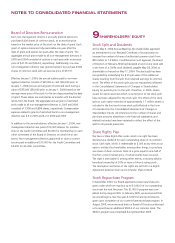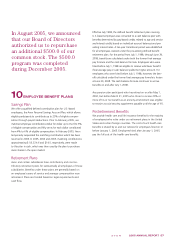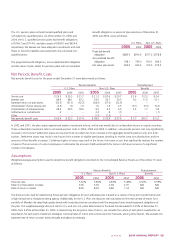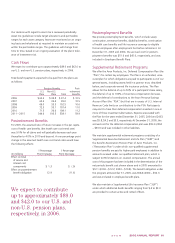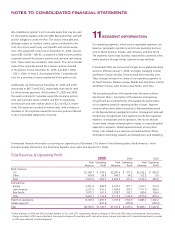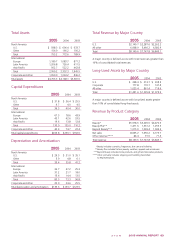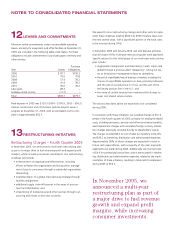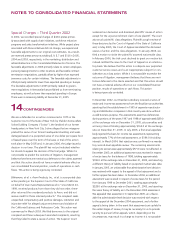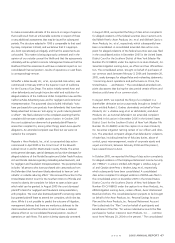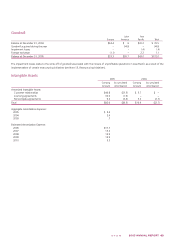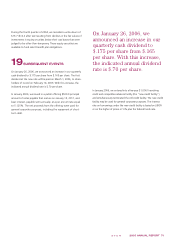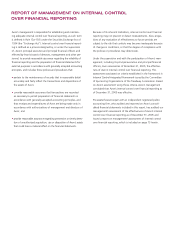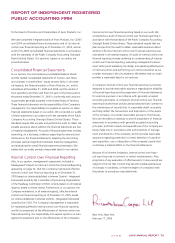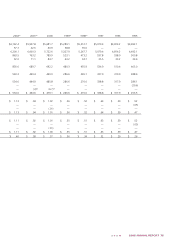Avon 2005 Annual Report Download - page 46
Download and view the complete annual report
Please find page 46 of the 2005 Avon annual report below. You can navigate through the pages in the report by either clicking on the pages listed below, or by using the keyword search tool below to find specific information within the annual report.NOTESTOCONSOLIDATEDFINANCIALSTATEMENTS
Special Charges – Third Quarter 2002
In 2002, we recorded Special charges of $43.6 pretax primar-
ily associated with supply chain initiatives, workforce reduction
programs and sales transformation initiatives. While project plans
associated with these initiatives did not change, we experienced
favorable adjustments to our original cost estimates. As a result,
we reversed pretax amounts totaling $.9, $.7 and $1.8 in 2005,
2004 and 2003, respectively, in the marketing, distribution and
administrative line in the Consolidated Statements of Income. The
favorable adjustments in 2003 primarily relate to certain employees
pursuing reassignments to other locations and favorable contract
termination negotiations, partially offset by higher than expected
severance costs for certain initiatives. The favorable adjustments in
2004 primarily related to lower than expected spending in Europe.
The favorable adjustments in 2005 primarily related to govern-
ment regulations in Venezuela that prohibited us from terminating
employees, as well as lower than expected spending in Europe.
There was no remaining liability at December 31, 2005.
14
CONTINGENCIES
We are a defendant in an action commenced in 1975 in the
Supreme Court of the State of New York by Sheldon Solow d/b/a
Solow Building Company (“Solow”), the landlord of our former
headquarters in New York City. Solow alleges that we misappro-
priated the name of our former headquarters building and seeks
damages based on a purported value of one dollar per square foot
of leased space over the term of the lease. A trial of this action
took place in May 2005 and, in January 2006, the judge issued a
decision in our favor. The plaintiff has not yet indicated whether
he intends to appeal the decision of the trial judge. While it is
not possible to predict the outcome of litigation, management
believes that there are meritorious defenses to the claims asserted
and that this action should not have a material adverse effect on
our consolidated financial position, results of operations or cash
flows. This action is being vigorously contested.
Blakemore, et al. v. Avon Products, Inc., et al. is a purported class
action pending in the Superior Court of the State of California
on behalf of Avon Sales Representatives who “since March 24,
1999, received products from Avon they did not order, there-
after returned the unordered products to Avon, and did not
receive credit for those returned products.” The complaint seeks
unspecified compensatory and punitive damages, restitution and
injunctive relief for alleged unjust enrichment and violation of
the California Business and Professions Code. This action was
commenced in March 2003. We filed demurrers to the original
complaint and three subsequent amended complaints, asserting
that they failed to state a cause of action. The Superior Court
sustained our demurrers and dismissed plaintiffs’ causes of action
except for the unjust enrichment claim of one plaintiff. The court
also struck plaintiffs’ class allegations. Plaintiffs sought review of
these decisions by the Court of Appeal of the State of California
and, in May 2005, the Court of Appeal reinstated the dismissed
causes of action and the class allegations. In January 2006, we
filed a motion to strike the plaintiffs’ asserted nationwide class.
In February 2006, the trial court declined to grant our motion but
instead certified the issue to the Court of Appeal on an interlocu-
tory basis. We believe that this action is a dispute over purported
customer service issues and is an inappropriate subject for con-
sideration as a class action. While it is not possible to predict the
outcome of litigation, management believes that there are meri-
torious defenses to the claims asserted and that this action should
not have a material adverse effect on our consolidated financial
position, results of operations or cash flows. This action
is being vigorously contested.
In December 2002, our Brazilian subsidiary received a series of
excise and income tax assessments from the Brazilian tax authorities
asserting that the establishment in 1995 of separate manufactur-
ing and distribution companies in that country was done without
a valid business purpose. The assessments assert tax deficiencies
during portions of the years 1997 and 1998 of approximately $89.0
at the exchange rate on December 31, 2005, plus penalties and
accruing interest totaling approximately $163.0 at the exchange
rate on December 31, 2005. In July 2003, a first-level appellate
body rejected the basis for income tax assessments representing
approximately 77% of the total assessment, or $194.0 (including
interest). In March 2004, that rejection was confirmed in a manda-
tory second-level appellate review. The remaining assessments
relating to excise taxes (approximately $57.0) were not affected. In
December 2003, an additional assessment was received in respect
of excise taxes for the balance of 1998, totaling approximately
$106.0 at the exchange rate on December 31, 2005, and asserting
a different theory of liability based on purported market sales data.
In January 2005, an unfavorable first administrative level decision
was received with respect to the appeal of that assessment and a
further appeal has been taken. In December 2004, an additional
assessment was received in respect of excise taxes for the period
from January 1999 to December 2001, totaling approximately
$228.0 at the exchange rate on December 31, 2005, and asserting
the same theory of liability as in the December 2003 assessment.
We appealed that assessment. In September 2005, an unfavor-
able first administrative level decision was received with respect
to the appeal of the December 2004 assessment, and a further
appeal is being taken. In the event that assessments are upheld in
the earlier stages of review, it may be necessary for us to provide
security to pursue further appeals, which, depending on the
circumstances, may result in a charge to income. It is not possible


